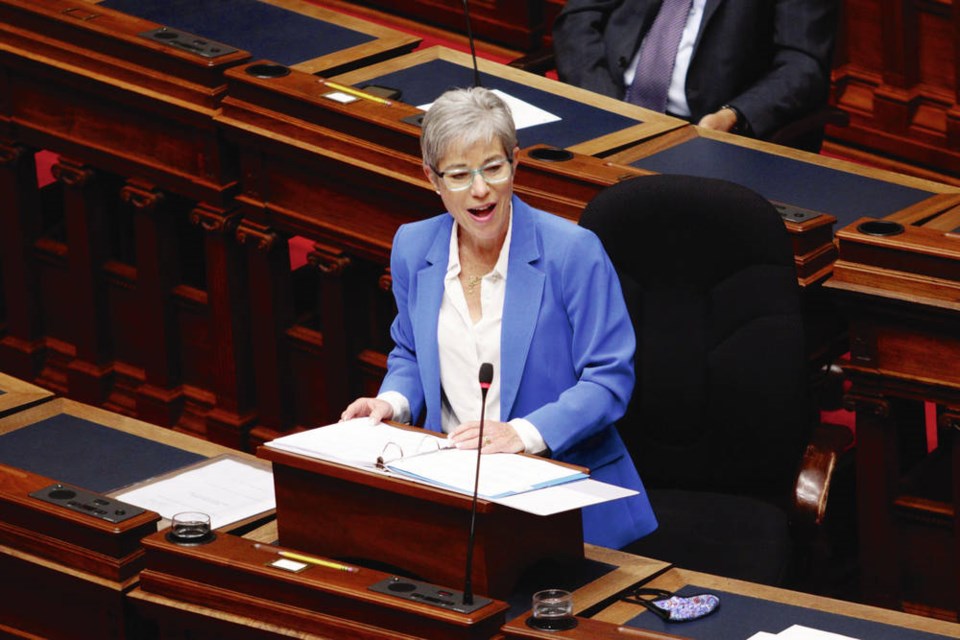The total cost of dealing with COVID-19 in B.C. stands at $10 billion, with much more to come, according to budget documents.
The cost of the medical measures is huge, but spending throughout the economy to cope with the public-health countermeasures is even bigger.
Breakdowns in documents released Tuesday show billions in direct spending and billions more in deferred taxation. The total outlay of direct spending is listed at $6.7 billion over the year since the crisis developed. Financial supports and economic-recovery programs have consumed much more of that cash than medical costs.
Direct spending on health and mental health tallied $2 billion. The rest is across a broad range of support measures aimed at people or entities coping with all the impacts associated with social distancing and curtailing activities.
Those impacts all flow from the five per cent contraction in the overall economy that was recorded in 2020 as activity was curtailed. “I feel like I’m losing count of those programs,” Finance Minister Selina Robinson remarked during a virtual scrum.
There is some crossover in the categorization. There is a $230-million outlay for “jobs in health care,” which would be a medical cost, but it’s listed as an economic recovery measure as well. The economic measures include the recovery benefit ($1.3 billion), the emergency benefit for workers ($645 million), the general economic recovery program ($1.4 billion) and many others.
The federal government committed more than $3 billion to B.C., much of it as part of a national safe restart agreement reached last summer. That funding is in the mix outlined above. Some of it is still to be spent on a 50-50 cost-sharing basis, much of it aimed at transit and municipal supports.
The $6.7 billion is direct spending, but there are other costs that push the tally higher. There were various tax adjustments and reductions that amount to another $3 billion in foregone revenue. The carbon tax was scheduled to go up on April 1, but that was postponed, at a cost of $268 million. School tax cuts on commercial properties, a PST rebate on equipment purchases and the ICBC rebate are among the other deferral costs.
There are also “temporary” measures like the $196 million spent buying temporary hotels to house decamped homeless people. The purchases are one-time costs, but whether they are really temporary is up for debate.
The $2 billion in direct health spending covered a wide range of costs. They include the lab costs of the 2.4 million COVID-19 tests administered to date, vaccines, the major changes to how long-term and assisted-care facilities are managed and the hundreds of people hired to do contact tracing of individuals who test positive.
Also listed, but not itemized, are the personal protective equipment, the surgical renewal drive to catch up to all the cancellations imposed for a time last year, “increased staffing across the health spectrum” and free hospital parking, among many others.
The accounting covers mostly the year concluded March 31, although much of it carries past that date. The budget for 2021-22 includes another $3.25 billion for pandemic costs listed as contingencies. That includes $900 million for health-related COVID-19 management and another billion for economic support measures. More than a billion dollars is expected to be spent over the subsequent two years as well.
The situation makes for a bigger hike in the health budget than usual.
All of which explains the plea tucked among the budget documents for a new deal with Ottawa to bring more ongoing federal money to B.C.
“While these collaborative investments that have supported British Columbians … have largely ended, the pandemic and its wide-ranging impacts have not.”
The statement said Ottawa’s move to curb growth in health transfer payments added to the strain provincial systems were under even before the virus hit. One-time payments during the pandemic have helped, but the long-term partnership needs to be fixed.
It also called for more federal money across the board. The rationale is justified, but Monday’s federal budget is far deeper in the red than B.C.’s.
The co-operative spirit between B.C. and Ottawa will likely subside when the emergency does, because there’s a serious national argument coming about how this country is financed.



